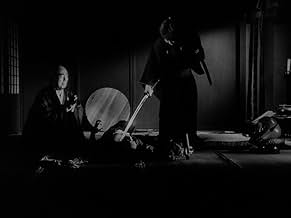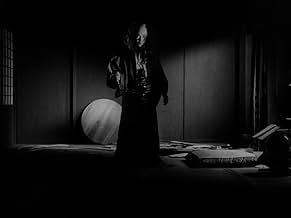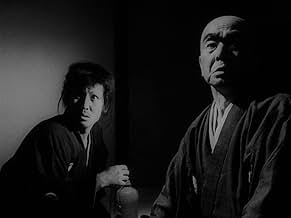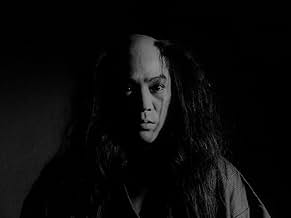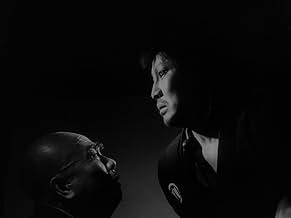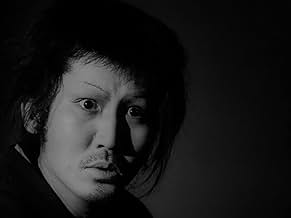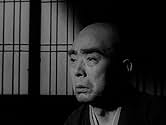NOTE IMDb
7,9/10
3,3 k
MA NOTE
Ajouter une intrigue dans votre langueAfter being robbed by a geisha, a ronin warrior carves a bloody path to seek revenge.After being robbed by a geisha, a ronin warrior carves a bloody path to seek revenge.After being robbed by a geisha, a ronin warrior carves a bloody path to seek revenge.
- Réalisation
- Scénario
- Casting principal
Avis à la une
A strangely hypnotic and violent tale of greed, betrayal and revenge, this tale is a masterclass in cinematography and lighting. In fact, this has to be among the best lit films I have ever seen. Set designs are minimal and intersting and so is the story and it manages to hold the attention pretty nicely. The middle section of the film is a bit slow and that could have been worked on but otherwise it's good. The twist at the end works well. All in all, a pretty masterful work of art and a very underrated piece of samurai cinema.
A heartbroken samurai in deep need of money is pushed to the edge and seeks revenge for his poor soul. But as he goes deeper with his revenge, discovers the people who stifled him may not be as different of people after all.
Pretty much a stylistic film akin to other famous Film Noir of the 40s and 50s. I would even categorize it as 'Gothic' and verging towards Expressionism with its deep saturated shadows and lighting that shadows the mental state of the film's characters. Its such a vision to be honest.
The story is what I believe is the weakest of the story. Its somewhat standard in a sense AND if you know his other film, you kinda knew what will happens. Its not as left field AND thematically rich compared to Funeral Parade of Roses. It's a story that had been told a hundred times AND while unique in its infusion of his dreamy stylings - it does not really feel like it adds much to the film. It works but not in a magical way that his early works shine through. It's more or less a preference thing on my side.
Acting wise, this is such a masterful direction. It is also Gothic by nature AND there is a sense of surrealism in how elevated their performances are. It perfectly matches the highly stylistic nature of the film, which I love. Katsuo Nakamura is amazing in his performance as a crazed samurai who just wants some money to escape his position. He really captures what this films what to evoke. Its kinda sad looking into his filmography that he seems to have gotten the prestige I think he could have.
Overall, a very worthy film to watch. It holds well against Funeral Parade AND shows a master stylist who knows how to modulate performers to boot.
Pretty much a stylistic film akin to other famous Film Noir of the 40s and 50s. I would even categorize it as 'Gothic' and verging towards Expressionism with its deep saturated shadows and lighting that shadows the mental state of the film's characters. Its such a vision to be honest.
The story is what I believe is the weakest of the story. Its somewhat standard in a sense AND if you know his other film, you kinda knew what will happens. Its not as left field AND thematically rich compared to Funeral Parade of Roses. It's a story that had been told a hundred times AND while unique in its infusion of his dreamy stylings - it does not really feel like it adds much to the film. It works but not in a magical way that his early works shine through. It's more or less a preference thing on my side.
Acting wise, this is such a masterful direction. It is also Gothic by nature AND there is a sense of surrealism in how elevated their performances are. It perfectly matches the highly stylistic nature of the film, which I love. Katsuo Nakamura is amazing in his performance as a crazed samurai who just wants some money to escape his position. He really captures what this films what to evoke. Its kinda sad looking into his filmography that he seems to have gotten the prestige I think he could have.
Overall, a very worthy film to watch. It holds well against Funeral Parade AND shows a master stylist who knows how to modulate performers to boot.
It is sometime during the Edo period, and Soemon is a Ronin living under the assumed name of Gengobe in Fukugawa, Tokyo. Indebted and unable to acquire the necessary funds to join the 47 Ronin in their quest of vengeance, he spends his days drinking sake and his nights with geishas. One geisha in particular: Koman, who pledges her eternal love for him. This love proves to be fickle, for Koman is a married woman. After his servant Hachiemon acquires 100 Ryo for Soemon to join the Ronin, he is quickly swindled by Koman and her husband Sangorô. Left penniless once more, Soemon descends into a bloody spiral of insanity and violence from which he may never return.
Written and directed by Toshio Matsumoto- and based on the Kabuki play 'Kamikakete Sango Taisetsu' by Nanboku Tsuruya and Shûji Ishizawa- 'Shura' is a strikingly photographed tale of revenge and madness that plays like a samurai film noir. Containing hard-hitting violence, a cynical anti-hero and a duplicitous femme fatale, the film bears many of the hallmarks that informed the noir movement of the 40's and 50's. Told in a non-linear fashion, the narrative incorporates flashbacks, alternative scenarios and repetition, challenging and confusing the viewer. The story is a gritty, dark one, maintaining a bleak and fatalistic tone, which is only heightened by the striking cinematography from Tatsuo Suzuki.
Shot in black and white, Suzuki makes excellent, evocative use of light and shadows, creating a startling contrast that adds a sinister sense of despair and claustrophobia to proceedings. His usage of dissolves, super-impositions, angled shots and zooms heightens the narrative tension, whilst also lending the film a surreal, eerie quality that strengthens the narrative impact. Suzuki also utilises the minimalist sets- a nod to the film's origins in Kabuki theatre- masterfully, making the most of the limited spaces in an artful and imaginative way.
A frequent collaborator of Matsumoto's- working on at least three of his films, including the acclaimed 'Funeral Parade of Roses'- Suzuki was at the forefront of Japanese experimental cinema. Working alongside a variety of independent directors, Suzuki made a name for himself as an innovator in terms of cinematography and its capabilities. His avant-garde work could very well be seen as influential on, or as a forerunner to, the work of Shinya Tsukamoto, or even David Lynch. Here, he leaves the audience wide-eyed in wonder at the eerie, noiresque imagery- be it of apparent floating lamps chasing our central character or the beautiful visage of a geisha, highlighting the torment in her eyes. Throughout 'Shura,' Suzuki's efforts don't just bolster the narrative and its tone- they leave you spellbound.
As do the intense performances from the cast, most notably Katsuo Nakamura as Soemon. A former Kabuki actor, Nakamura displays his character's complex emotions and inner turmoil fantastically, utilizing expressive gestures, movements and facial expressions. He interacts with the rest of the cast convincingly, painting a compelling portrait of a man driven to madness and violence by the actions of others. Alongside him, Yasuko Sanjo delivers a masterclass in understatement as the geisha Koman. She brings much grace and elegance to the role, perhaps accrued from her years as a dancer, leaving an indelible impression on the viewer. Masao Imafuku also does fine work as the servant Hachiemon, the only real honorable one in the film; stealing every scene he's in.
Although those who shy away from violent films might not appreciate the amount of gore in 'Shura', anyone who enjoys Samurai movies, or a good revenge story, will likely be most pleased by the film. Beautifully shot by Tatsuo Suzuki and featuring commendable performances from all in the cast, there's a lot going for it. A strong narrative, deft direction- 'Shura' may be one of the best Samurai film noirs you'll ever see.
Written and directed by Toshio Matsumoto- and based on the Kabuki play 'Kamikakete Sango Taisetsu' by Nanboku Tsuruya and Shûji Ishizawa- 'Shura' is a strikingly photographed tale of revenge and madness that plays like a samurai film noir. Containing hard-hitting violence, a cynical anti-hero and a duplicitous femme fatale, the film bears many of the hallmarks that informed the noir movement of the 40's and 50's. Told in a non-linear fashion, the narrative incorporates flashbacks, alternative scenarios and repetition, challenging and confusing the viewer. The story is a gritty, dark one, maintaining a bleak and fatalistic tone, which is only heightened by the striking cinematography from Tatsuo Suzuki.
Shot in black and white, Suzuki makes excellent, evocative use of light and shadows, creating a startling contrast that adds a sinister sense of despair and claustrophobia to proceedings. His usage of dissolves, super-impositions, angled shots and zooms heightens the narrative tension, whilst also lending the film a surreal, eerie quality that strengthens the narrative impact. Suzuki also utilises the minimalist sets- a nod to the film's origins in Kabuki theatre- masterfully, making the most of the limited spaces in an artful and imaginative way.
A frequent collaborator of Matsumoto's- working on at least three of his films, including the acclaimed 'Funeral Parade of Roses'- Suzuki was at the forefront of Japanese experimental cinema. Working alongside a variety of independent directors, Suzuki made a name for himself as an innovator in terms of cinematography and its capabilities. His avant-garde work could very well be seen as influential on, or as a forerunner to, the work of Shinya Tsukamoto, or even David Lynch. Here, he leaves the audience wide-eyed in wonder at the eerie, noiresque imagery- be it of apparent floating lamps chasing our central character or the beautiful visage of a geisha, highlighting the torment in her eyes. Throughout 'Shura,' Suzuki's efforts don't just bolster the narrative and its tone- they leave you spellbound.
As do the intense performances from the cast, most notably Katsuo Nakamura as Soemon. A former Kabuki actor, Nakamura displays his character's complex emotions and inner turmoil fantastically, utilizing expressive gestures, movements and facial expressions. He interacts with the rest of the cast convincingly, painting a compelling portrait of a man driven to madness and violence by the actions of others. Alongside him, Yasuko Sanjo delivers a masterclass in understatement as the geisha Koman. She brings much grace and elegance to the role, perhaps accrued from her years as a dancer, leaving an indelible impression on the viewer. Masao Imafuku also does fine work as the servant Hachiemon, the only real honorable one in the film; stealing every scene he's in.
Although those who shy away from violent films might not appreciate the amount of gore in 'Shura', anyone who enjoys Samurai movies, or a good revenge story, will likely be most pleased by the film. Beautifully shot by Tatsuo Suzuki and featuring commendable performances from all in the cast, there's a lot going for it. A strong narrative, deft direction- 'Shura' may be one of the best Samurai film noirs you'll ever see.
The only possible parallel I can furnish to position SHURA in the greater map of Japanese cinema is the last 20 minutes of that soul-destroying masterpiece Kihachi Okamoto directed in 1966, the indomitable SWORD OF DOOM. And even that comparison leaves a little something to be desired. Not only because SHURA is an exhausting 2+ hours of that same brooding sludge so thick you could slice it with a wakizashi, but also because, directed as it is by experimental guerilla rebel Toshio Matsumoto, it stands as a somewhat different beast from the general hobnob of genre cinema.
Woven of that same tragic almost Shakespearian fabric, with a protagonist who like Ryunosuke Tsukue in SWORD OF DOOM finds himself doomed to walk the path of demons in a downward spiral into madness and despair, SHURA is as bleak dark and hopeless a jidaigeki as was ever execrated and sealed from man and beast on celluloid. Unlike Ryunosuke Tsukue, however, who starts on the Great Buddha Mountain Pass and slowly cuts his way into his own private hell, Gengobe in SHURA starts in that private hell and plunges himself deeper in depths of the soul unknown. The movie opens with Gengobe hunted in pitch black by hovering lanterns held by unseen persecutors. He enters a house and finds a scene of carnage and mayhem, the floor strewn with mutilated bodies, limbs, others hanging dead from the ceiling. I told you it only starts there.
The movie itself exists in a hopeless purgatory. No establishing shots of anything. No daytime. The passage of time signaled with intertitles. The occasional external shot, a patch of gravel road, the frontside of a house, offers no relief, no room for breath, because it reminds us that there are no horizons or depth for the eye to rest. Everything was probably shot on soundstages with only a few lights strategically placed hither and thither, no doubt a lingering remnant of kabuki theater from which Japanese cinema has borrowed heavily. With no broader world to be measured against, the interiors and the story that takes place inside and the characters that breathe and walk and double-cross and slaughter each other in them, all seem to hover suspended in absolute suffocating darkness and everlasting night.
The title really says it all. The Ashuras, a rank of lower demigods in Buddhism, are meant to reflect the mental state of a human being obsessed with force and violence, always looking for an excuse to get into a fight, angry with everyone and unable to maintain calm or solve problems peacefully.
It's not only cynic or tragic as the best of jidaigekis usually are, it's positively bleak and unremitting. That shots and entire scenes repeat themselves automaton-like, first taking place inside the protagonist's anguished mind and then reality, only serves to reinforce the existential phlegm through which SHURA wades waist-deep for two hours. The atmosphere is so oppressing that questions of clunky expositional dialogue such as the characters often spout ("this is your wife's head" says a character while brandishing said head in plain sight) and theatrical exaggerated acting are rendered almost meaningless.
The story is still good, gripping, engrossing, as classic and plain and stripped of all fat as the best jidaigekis usually are, with a limited cast and sets that hint at the stageplay origins of the script, but in the end it's the overarching feeling of despair that stays with you. A movie so much of its time and place, almost impossible to even think of it as coming from anywhere else than Japan of the late 60's-early 70's, that will by its very nature appeal only to a limited audience. If you came this far and liked what you read then you're probably ready to brave SHURA. Beware all who enter. There is real cacodemonia here.
Woven of that same tragic almost Shakespearian fabric, with a protagonist who like Ryunosuke Tsukue in SWORD OF DOOM finds himself doomed to walk the path of demons in a downward spiral into madness and despair, SHURA is as bleak dark and hopeless a jidaigeki as was ever execrated and sealed from man and beast on celluloid. Unlike Ryunosuke Tsukue, however, who starts on the Great Buddha Mountain Pass and slowly cuts his way into his own private hell, Gengobe in SHURA starts in that private hell and plunges himself deeper in depths of the soul unknown. The movie opens with Gengobe hunted in pitch black by hovering lanterns held by unseen persecutors. He enters a house and finds a scene of carnage and mayhem, the floor strewn with mutilated bodies, limbs, others hanging dead from the ceiling. I told you it only starts there.
The movie itself exists in a hopeless purgatory. No establishing shots of anything. No daytime. The passage of time signaled with intertitles. The occasional external shot, a patch of gravel road, the frontside of a house, offers no relief, no room for breath, because it reminds us that there are no horizons or depth for the eye to rest. Everything was probably shot on soundstages with only a few lights strategically placed hither and thither, no doubt a lingering remnant of kabuki theater from which Japanese cinema has borrowed heavily. With no broader world to be measured against, the interiors and the story that takes place inside and the characters that breathe and walk and double-cross and slaughter each other in them, all seem to hover suspended in absolute suffocating darkness and everlasting night.
The title really says it all. The Ashuras, a rank of lower demigods in Buddhism, are meant to reflect the mental state of a human being obsessed with force and violence, always looking for an excuse to get into a fight, angry with everyone and unable to maintain calm or solve problems peacefully.
It's not only cynic or tragic as the best of jidaigekis usually are, it's positively bleak and unremitting. That shots and entire scenes repeat themselves automaton-like, first taking place inside the protagonist's anguished mind and then reality, only serves to reinforce the existential phlegm through which SHURA wades waist-deep for two hours. The atmosphere is so oppressing that questions of clunky expositional dialogue such as the characters often spout ("this is your wife's head" says a character while brandishing said head in plain sight) and theatrical exaggerated acting are rendered almost meaningless.
The story is still good, gripping, engrossing, as classic and plain and stripped of all fat as the best jidaigekis usually are, with a limited cast and sets that hint at the stageplay origins of the script, but in the end it's the overarching feeling of despair that stays with you. A movie so much of its time and place, almost impossible to even think of it as coming from anywhere else than Japan of the late 60's-early 70's, that will by its very nature appeal only to a limited audience. If you came this far and liked what you read then you're probably ready to brave SHURA. Beware all who enter. There is real cacodemonia here.
Demons is an adaptation of Tsuruya Namboku's play Kamikakete Sango Taisetsu, a kabuki theater classic based on an episode of the 47 rônins. It goes deeper, darker and crueler, than any other samurai movies I've seen. its pure malice. And thrives on diabolical suspense. Its a mans journey through hate and revenge, and his descent into madness, it is slow, painful and bloody. A remarkable exercise in cynical nihilism that is so breathtakingly grim that it becomes undeniably compelling. Along with Katsuo Nakamura's haunting performance in the lead role.
The story is not realistic. The setting and the intruducing course of action is undoubtly surreal, and almost every character in Demons is unsympathetic and devious with the possible exception of Hachiemon, who is so selfless in his sacrifices for his master that he becomes annoyingly obsequious. But thats part of the films appeal.
Matsumoto adopts an expressionist aesthetic similiar to the theatrical- play. And the editing accumulates false starts and several scenes are repeated almost identically, first dreamed then in real life. This can be very confusing and it creates incessant ruptures which breaks the narrative fluidity.
Demons is not perfect but its appeal is one you rarely see in cinema, and, of course, it has an extrodinary story and directing which thus class thus as one of world-cinemas timeless gems.
The story is not realistic. The setting and the intruducing course of action is undoubtly surreal, and almost every character in Demons is unsympathetic and devious with the possible exception of Hachiemon, who is so selfless in his sacrifices for his master that he becomes annoyingly obsequious. But thats part of the films appeal.
Matsumoto adopts an expressionist aesthetic similiar to the theatrical- play. And the editing accumulates false starts and several scenes are repeated almost identically, first dreamed then in real life. This can be very confusing and it creates incessant ruptures which breaks the narrative fluidity.
Demons is not perfect but its appeal is one you rarely see in cinema, and, of course, it has an extrodinary story and directing which thus class thus as one of world-cinemas timeless gems.
Le saviez-vous
- AnecdotesIncluded among Letterboxd's Top 250 Horror Films.
Meilleurs choix
Connectez-vous pour évaluer et suivre la liste de favoris afin de recevoir des recommandations personnalisées
- How long is Demons?Alimenté par Alexa
Détails
- Durée
- 2h 14min(134 min)
- Couleur
- Mixage
- Rapport de forme
- 1.37 : 1
Contribuer à cette page
Suggérer une modification ou ajouter du contenu manquant

